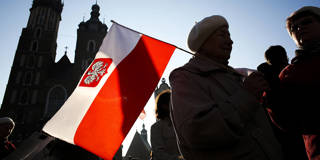OnPoint Subscriber Exclusive
Interviews feature exclusive interviews with prominent leaders and thinkers on issues of global importance.

The Roots of Polish Populism
Since coming to power eight years ago, Poland's populist ruling party has continued to win elections even as it has attacked the country's liberal institutions and individual rights. With Poland holding a general election on October 15, will its ability to manipulate Polish history and culture as a political cudgel continue to bring them electoral success?
Irena Grudzińska Gross: With Poland’s parliamentary election coming next month, your new book, Society of Populists, co-authored with Przemysław Sadura, is being widely read and discussed. Even Prime Minister Mateusz Morawiecki has commented on it, though he belongs to the populist ruling party. What does your title mean, and how are you defining populism?
Sławomir Sierakowski: We wanted to understand populism as a social phenomenon. That meant examining the specific societal factors behind populist victories, and then studying how populist victories have changed society. No one else has approached the subject like that.